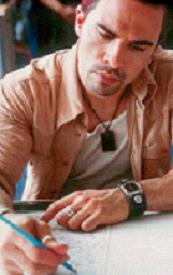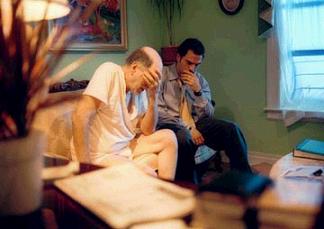

A few weeks prior to the writing of this review, Hispanics became the largest minority in America. As they slowly work their ways into the fabric of American life, their stories will wend their way to the screen. Inevitably, like other minorities, there will be a rash of generational rivalry films that typically deal with a traditional immigrant parent, and a child who wants to go into some unconventional field (usually a type of art). The Debut, American Chai, Bend It Like Beckham, heck, even My Big Fat Greek Wedding all fall somewhere into that spectrum. Washington Heights focuses less on the cultural aspect of its characters. It plays an important part, but the overriding story is about a son and his father.
The son is Carlos (Manny Perez, Brother, Dinner Rush), who wants to illustrate comics. His boss believes he has talent but needs more focus, but his father Eddie (Tomas Milian, Traffic, The Yards) believes Eddie is wasting his time. Eddie, a Dominican immigrant, owns a small bodega in the Washington Heights area of Manhattan. Economically, the area is not the greatest, but it has its own 'flavor' and sense of community. Carlos dreams of working for Gotham comics, and earning enough money to buy him and his girlfriend Maggie (Andrea Navedo, Double Take, Girl 6) an apartment somewhere else. Maggie's brother Angel (Bobby Cannavale, The Guru, The Bone Collector) wants to escape in a different way. Angel has a dubious past, but is trying to save up money for to return to the Dominican Republic.
A robber forces Carlos to put his dream on hold. The robber shoots Eddie, and Carlos must run the store during the day and tend to Eddie at night while his father rehabilitates. Running the store means no time for him to draw. This story enough could make for an interesting film. However, writer/director Alfredo De Villa (Neto's Run) and co-writers Nat Moss, Junot Diaz, and Perez falter by adding Mickey (Danny Hoch, Black Hawk Down, Bamboozled). Mickey is Carlos' stupid friend. Mickey wants to compete in a bowling tournament in Las Vegas, but lacks the entrance fee. Mickey's father (Jude Ciccolella, Head of State, Daredevil) lent Eddie a large sum of money, and is forcing Eddie to work at the bodega to pay him back. De Villa probably felt that this was a necessary development in order to give Eddie a plausible reason for working at the place he despises.
It's too bad that the Mickey character turns the film into melodrama. He finds the money by stealing it from Angel, which sets into motion a series of events that become increasingly ridiculous. The emotional level of the film rises steadily, building towards some huge breaking point. Tensions between Eddie and Carlos rise as they spend more time together. Eddie has less time to draw and his anger towards his father strains his relationship with Maggie. The Angel character is a joke anyways, and just gets louder and more obnoxious. Everything comes together in a huge pile up at the end of the film that feels artificial. It's as if De Villa feels he is clever in making this ending that combines his separate storylines, but the stories play out so lamely that one doesn't care. One wishes he could have kept the focus on Carlos and Eddie, and Carlos' dreams of success. This way, the film is more intimate, less hokey, and more meaningful.